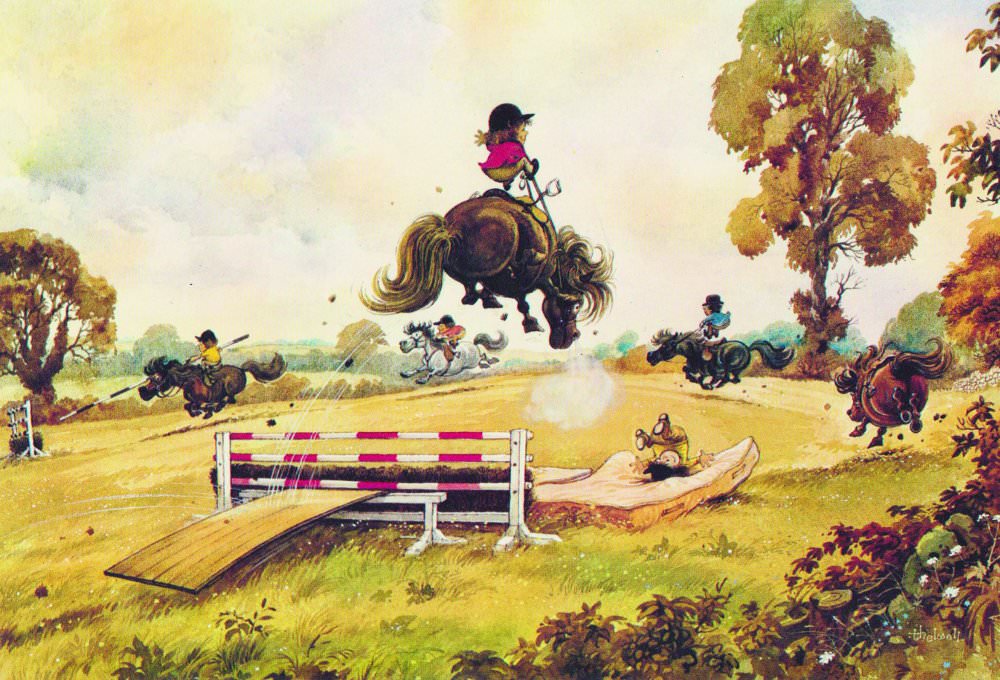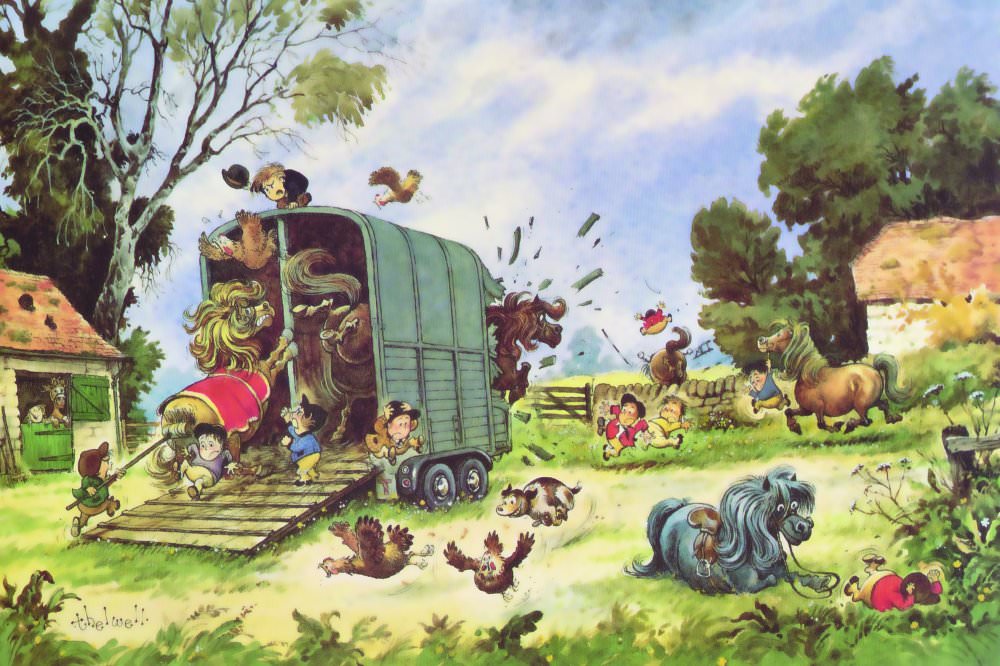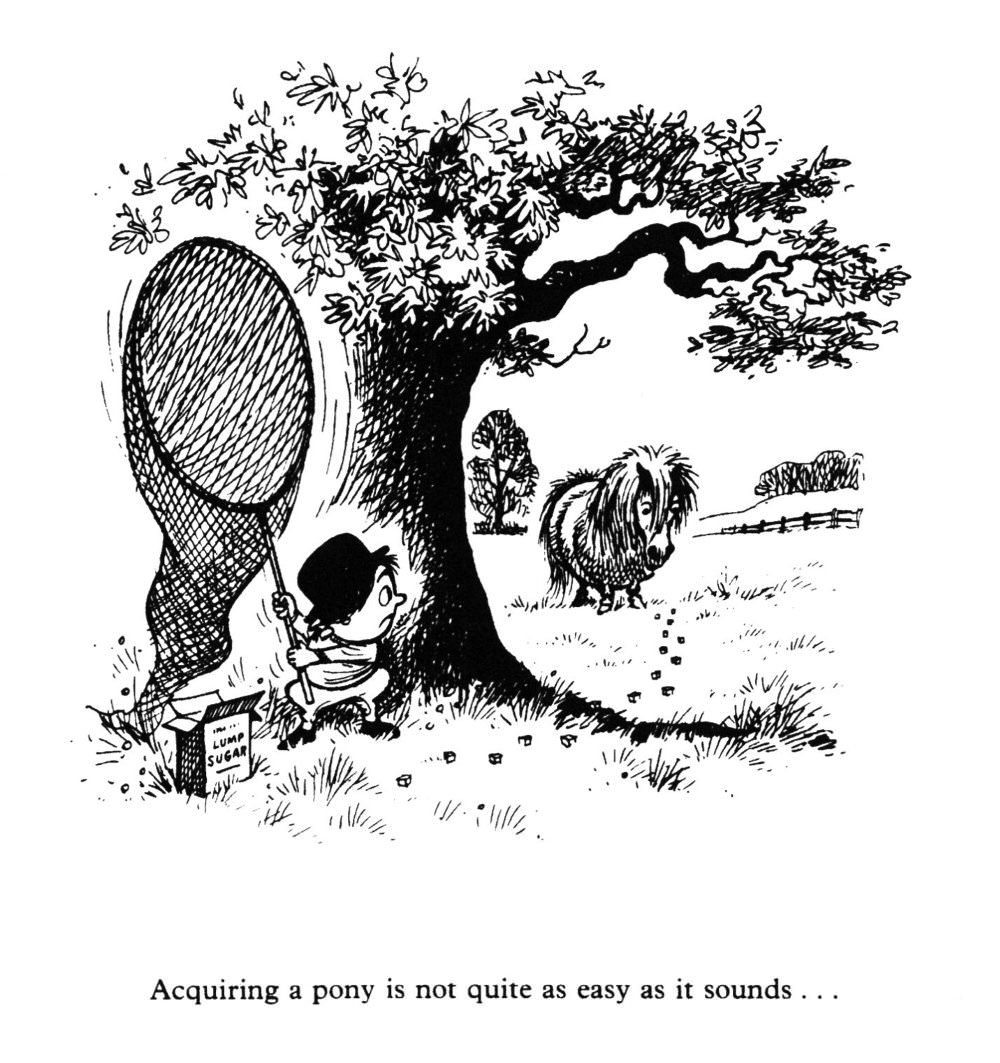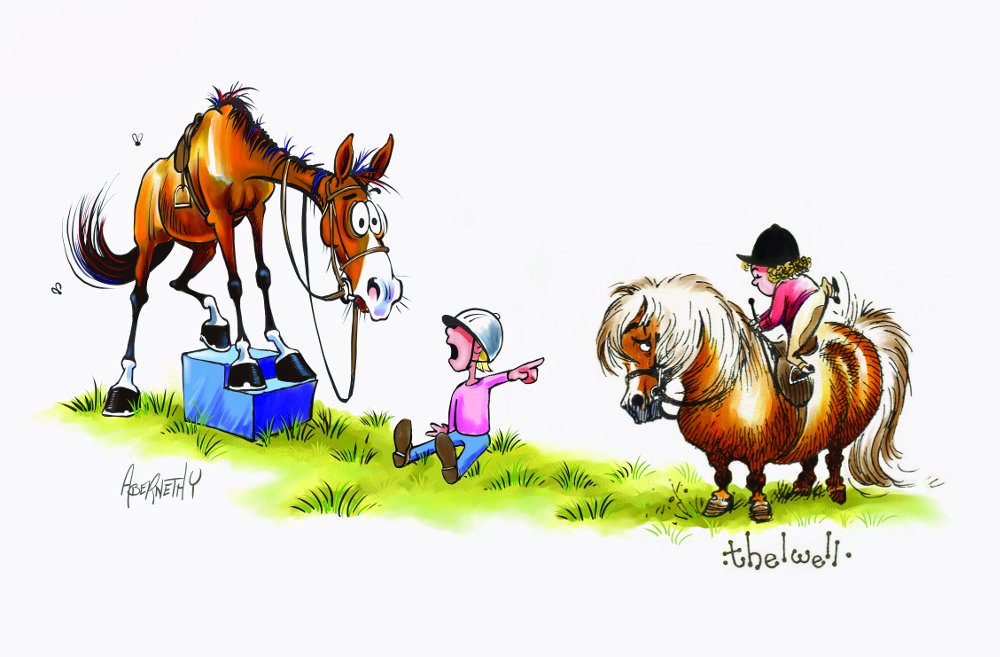Fat Ponies Funny Fat Ponies Cartoons

By Rebecca M. Didier
There's something equestrians need every bit as much as we need horses. Yes, the easy answer here is we need money (quite a lot of it) to pay for our equine habit—all the miscellaneous items required to keep, ride, and compete our favorite four-legged animals.
We also need understanding and forgiving friends and family, seeing as often we'd rather spend time with our horses than with them.
We need flexible schedules that don't interfere with morning/evening/weekend barn plans, and vehicles that work despite mechanical neglect (our dollars have more important purchases to make) and interiors devoted solely to tack and blanket storage.
It is perhaps because of all these truths that what we really need is to laugh at ourselves.
The Internet abounds with memes and jokes aimed at the equestrian. They get the most likes; the rampant shares. Others comment: "#truth" "That's so me and my horse!" "Been there (like a million times before)!"
We are bound together not only by our love for horses, but by recognition of our shared insanity.
Instant Popularity
Horse humor was alive and well long before Facebook became the primary means of circulating a joke. In an era when horses were still a mode of transportation and a rural lifestyle common, cartoons with an equestrian slant appeared in newspapers and other print publications, breaking up wordy columns, giving readers a reason to pause for a laugh. And for decades, the most amusing illustrations often depicted a small girl and a fat pony in all manner of questionable scenarios: the calling card of artist Norman Thelwell.

Thelwell drew his first pony cartoon in 1953 for the British magazine Punch, and his life as an illustrator changed.
"The response was instantaneous," he wrote in his autobiography Wrestling with a Pencil (Methuen, 1986). "Suddenly I had fan mail … I dreamed up some more horsey ideas, and people went into raptures."
Thelwell's "pony cartoons" took off, resulting in now classic books known throughout world, including Angels on Horseback, A Leg at Each Corner, and Thelwell's Riding Academy (which have just been re-released as one volume entitled Pony Cavalcade by Trafalgar Square Books). A line of merchandise thrived.
"I use to collect it all as a kid," admits Emma Ford, head groom for Olympic eventer Phillip Dutton. "Mugs, books, stickers—you name it, I had it! My first pony was a true Shetland called Georgie, and I could easily compare his antics to those depicted in Thelwell cartoons."
"Somehow the Thelwell books were always around the house to be picked up again and again," says Lendon Gray, Olympic dressage rider and founder of Dressage4Kids, "and every time they brought a giggle. So often the cartoons related to an experience I had recently had with my pony."

Understanding the Equestrian Condition
Interestingly, Thelwell was not an equestrian himself—his only riding experience came at the end of World War II while he was posted in India.
"The horse bolted, much to the amusement of his colleagues," says his son David Thelwell, "and he decided never to risk his life in that way again!"
So how could a non-equestrian create cartoons that have resonated so consistently, even decades later, with real horse people?
"I think he wondered the same thing!" David says. "The reaction to the pony cartoons was a big surprise, and I suppose made his name. He covered so many subjects, but this is what people seemed to enjoy most. My father always loved drawing animals and horses, but seeing two tiny girls trying to capture their willful ponies in the field next to his studio was the spark that started his fascination with the interaction of children and horses. He also trained as a teacher when studying at art school, and most of his pony books were researched from real books on horsemanship. They are the normal methods, given a comic twist."
Thelwell's success depicting the "equestrian condition" may have had quite a bit to do with his skill as an artist. Devoted to the quiet beauties of country life, he had studied the shape of rural landscape since he was a boy, and the backgrounds of his paintings and drawings are often richly detailed. The juxtaposition, then, of a slightly ridiculous interaction between horse and human in the foreground, stands out all the more clearly.
"My introduction to Norman Thelwell's work was a little paperback called A Leg at Each Corner," remembers Jean Abernethy, creator of cartoon social media star Fergus the Horse. "I was a teenager at the time, a farm kid, riding a really good horse through field and forest with no saddle, no education in horsemanship nor art. I was delighted by the book because it was funny. I admired Thelwell's ability to create vivid facial expression with just a few strokes of his pen. I appreciated his capacity for creating motion using his sophisticated sense of composition … and a great hand with the pen. But most of all, it was his playfully satirical sense of humor that I admired. And somehow, deeper down, as I looked across each beautifully designed page, it helped instill in me the notion that drawing horses might be a profession."
Timeless Humor
While horses and their people were actually the primary subjects in relatively few of Norman Thelwell's many artworks, he did not seem to mind that his name eventually became synonymous with little girls and fat, hairy ponies. Thelwell's Independent obituary, written when the artist passed away in 2004, cites an episode at an agricultural fair when a woman pointed toward him, shouting, "Look at Thelwell!" He blanched, embarrassed by the scene. But the woman was actually pointing past him at—you guessed it—"a fat, hairy pony with a small child clinging to its back and three red-faced ladies" urging it forward.
"The word 'Thelwell' has been transformed from an adjective into a noun," agrees United States Eventing Association Hall of Fame inductee Denny Emerson. "We used to say, 'Look at that Thelwell pony.' Now, when we see a furball pony face, or a little kid flopping along, legs sticking out, grinning like mad, we just say, 'That's a Thelwell.' And anyone who knows anything knows exactly what is meant."

This year marks the 60th anniversary of the original publication of Thelwell's first book, Angels on Horseback, and its comic depictions of pony breeds, the trials of horse shopping, the challenges of show jumping, and the curiosities of hunting remain entertaining to the nth degree. In addition, there is something inherently comforting in knowing that, while we live in a world that is startlingly different than the one Thelwell inhabited, and while surely the rural lifestyle he celebrated in his artwork is threatened in many places, some things—no matter what else changes—remain the same through time. Our infatuation with the horse continues to play out in its various odd and often hilarious ways. And although we've learned quite a lot in the last 60 years, we can still immediately identify with the same kinds of mistakes and general silliness that takes place when two different species try so hard to communicate with each other.
"I think the humor is timeless," says David Thelwell. "What applied to riding 50 years ago has barely changed, and the underlying human behavior hasn't changed."
Artist Jean Abernethy says something similar when asked about Thelwell's place in the world today, especially in light of the immense reach of contemporary equine cartoon characters, like Fergus the Horse.
"Ponies still behave like ponies. And we still behave like humans," she says. "That is, we have expectations of what equines 'should' do for us. ('You should' is a very dangerous phrase.) Norman Thelwell's comedy continues to remind us to throw out expectations and take things lightly. Fergus (and his herd of friends) and Thelwell's pony characters all reserve the right to remain fundamentally equine. They also reserve the right to question human 'authority'—especially when it contradicts things fundamentally equine!"
Thelwell's Legacy
What a legacy—to have helped generations of equestrians laugh, always with gentle humor combined with a great deal of insight and spot-on expression. And what an inspiration, that today demand continues for Thelwell's books and merchandise, enough so that David now manages a Facebook page devoted to the brand.
"I try to vary the content and put up other subjects that were covered in my father's thousands of cartoons," he says, "but it is always the horsey ones that get a big reaction and many lovely comments."
Norman Thelwell's influence is felt in other ways, too. David is an artist in his own right, having been gently encouraged as a child, provided pens and paint. He steers clear of equestrian subjects, though, and is motivated instead by his lifetime love of birds and nature.

And then, of course, there is Jean Abernethy and Fergus the Horse.
"Sixty years from now," she says, "I would like someone somewhere, after sitting out a disconcerting (monster-in-the-grass) spook, to laugh and say: 'My horse had a Fergus moment!'"
Surely many of us will still be horse crazy and (therefore) in need of money … and a laugh. Chances seem pretty good she'll get her wish.
The special edition of Pony Cavalcade celebrating the 60th anniversary of Angels on Horseback by Norman Thelwell is available now from Trafalgar Square Books (www.horseandriderbooks.com).
This article originally appeared in the August 2017 issue of Horse Illustrated magazine. Click here to subscribe!
Source: https://www.horseillustrated.com/horse-community-little-girls-and-fat-hairy-ponies
0 Response to "Fat Ponies Funny Fat Ponies Cartoons"
Post a Comment